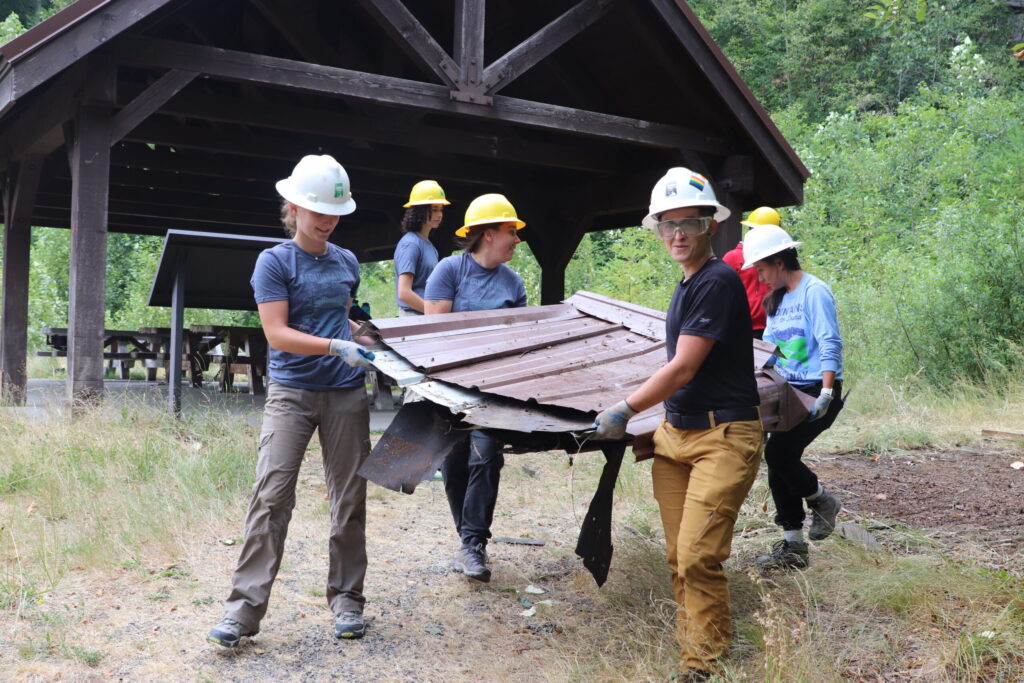Typically, Career and Technical Education (CTE) frameworks are written at a local level for use by a specific school or district. That approach has both strengths and challenges, according to PEI Project Specialist Michelle Townshend. “The frameworks are locally relevant,” she explains, “but the problem is that nobody outside of that district knows about them and other people end up re-creating the same things without much outside help.”

In contrast, in 2017 PEI Executive Director Kathryn Kurtz led work with the Pacific Mountain Workforce Development Council to begin working with a collaboration that included OSPI, school districts, community colleges, Tribes and employers to build a CTE framework that would be statewide and allow for local adaptation. The first framework launched in 2018 and PEI has been refining this process since. For the past two years, PEI Green Jobs Coordinator Heather Spalding and Townshend have been convening teams to develop more CTE frameworks for statewide use. Through the courses, students can earn high school credit, job skills, a degree of competency from a local employer and in some cases, dual credit at regional colleges.
As of mid-2023, PEI offers four CTE frameworks: Introduction to Forest Management, Advanced Forest Management, Introduction to Restoration Ecology and Advanced Restoration Ecology. Renewable Energy is in a draft stage, Introduction to Environmental and Sustainability Education, Advanced Environmental and Sustainability Education frameworks are currently being developed and four more frameworks are in pending further funding: Introduction to Aquaculture and Fisheries, Advanced Aquaculture and Fisheries, Introduction to Urban and Community Forestry and Advanced Urban and Community Forestry.
The courses are designed to work both as stand-alone courses and as part of a network that helps students navigate their high school graduation credits and plan for career choices. “All the fields of study are different, and there are transferable skills among them,” says Spalding. “A student may start out wanting to explore restoration ecology and then realize they’re more interested in becoming a teacher. We want to build a whole suite of courses that will help students figure out what they want to do, and understand what their next step toward their goals are.”
“All the fields of study are different, and there are transferable skills among them. A student may start out wanting to explore restoration ecology and then realize they’re more interested in becoming a teacher. We want to build a whole suite of courses that will help students figure out what they want to do, and understand what their next step toward their goals are.”
— PEI’s Associate Director of Green Jobs Heather Spalding
To develop each framework, PEI gathers a writing team with diverse and complementary skills. “We’ll have a restoration ecologist and a

teacher who has taught restoration ecology, their knowledge base is not the same and we want both perspectives incorporated,” Townshend notes. “One of them knows the material and the other knows how the material works in the field. PEI provides knowledge of the state and federal standards and we know what activities high school students are and are not allowed to do.”
Another key aspect of the writing process involves embedding Indigenous perspectives in each framework in ways that help PEI ensure that the course allows all students to demonstrate competency and understanding. “We have a board member who has participated in several of our writing workshops and she provides such a valuable perspective,” says Townshend. “We want to embed these perspectives in relevant, authentic ways and not just an add-on or afterthought.”
The frameworks address multiple issues for industry and educators alike. Spalding recently attended a forest management workshop where much of the conversation was centered around the industry’s aging workforce. “The whole focus was on what to do about this situation,” she says. “They were looking at how to get students skilled in different sectors to replace all the people who are getting ready to retire. At the other end, students can’t get into careers that they don’t know exist, so exposing them and creating maps to connect them with employers is really important.”
As a former high school science teacher, PEI’s Education Pathways Coordinator Chelsea Trout has witnessed how students benefit from such experiences. “Even if they don’t end up going into a scientific career, they come out with so much more confidence in themselves,” she says. “They respect and value the natural environment around them more. I’ve also had former students who went on to get natural resource degrees.”
Her role is to develop pathways for students who want to become educators with an outdoor learning lens. Starting the process early makes a difference, she maintains. “If they’re already confident in taking people outside when they’re in high school, by the time they become teachers they’ll be doing grander things when they’re 25 instead of when they’re 50. They’ll have a whole career of helping people get outdoors.”
To learn more about PEI’s Green jobs work and our CTE frameworks, visit our career connected learning page.
